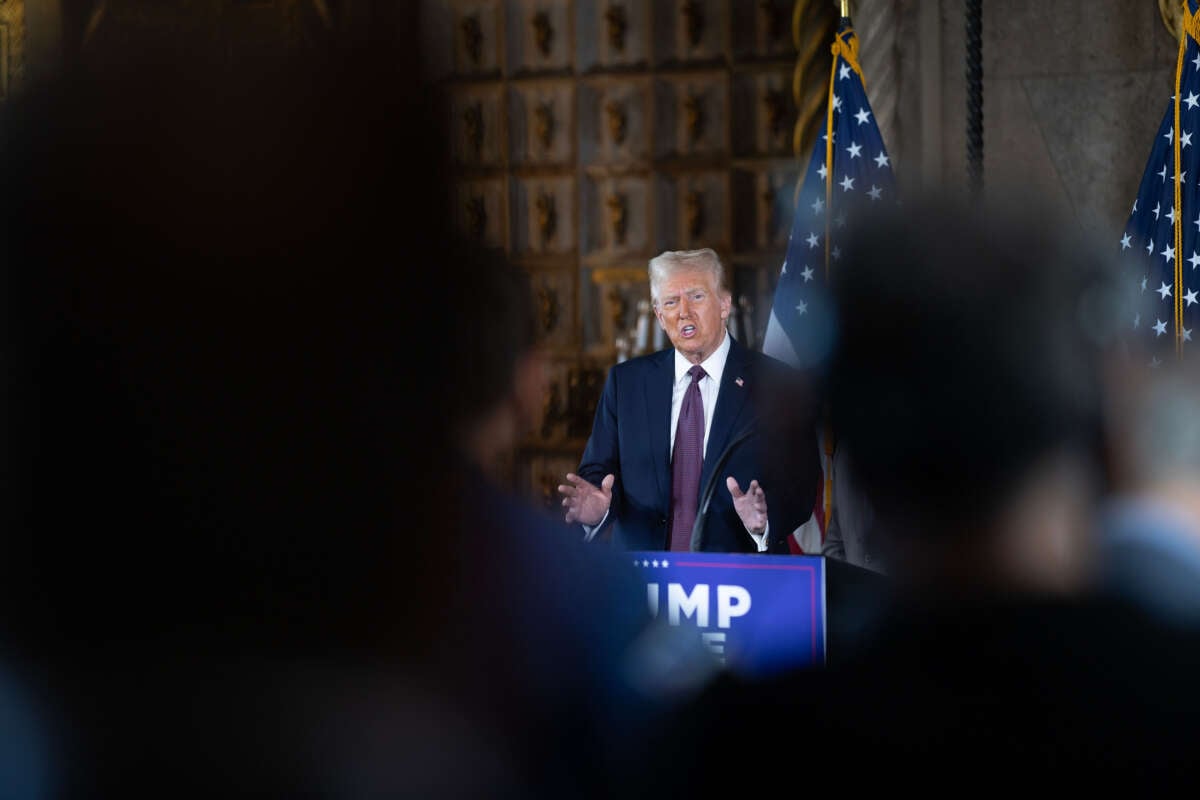The legal team for president-elect Donald Trump has submitted a brief to the U.S. Supreme Court, urging justices to prevent a sentencing hearing from being held later this week in a New York state-based case involving his attempts to subvert public notice filings during the 2016 presidential race.
Trump was convicted on May 30, 2024, in a case relating to his hush money payments to an adult film actress. Trump falsified business records from his company, the Trump Organization, to make reimbursements to his then-lawyer Michael Cohen to hide the payments in the run-up to Election Day 2016.
By falsifying those documents, Trump avoided having to include the hush money payments in Federal Election Commission (FEC) filings, which requires every election-related expenditure to be documented. In New York State, it is illegal to falsify business records to facilitate another crime.
A jury found Trump guilty of 34 felony counts relating to these actions. However, Trump appealed the ruling and the subsequent post-trial decisions after being found guilty, delaying his actual sentencing in the case up until now.
New York Supreme Court Justice Juan Merchan, who has overseen the case, planned to hold a sentencing hearing on January 10 that required Trump’s presence (either in person or electronically). Merchan has explained that he doesn’t intend to sentence Trump to jail time or probation, but that issuing a ruling of any kind means the case is completed, and that Trump will enter office with the record of being the only president ever convicted of a felony.
Trump sought to block the hearing date in state appellate courts. Earlier this week, an appellate judge denied his motion to delay the sentencing, leading to his legal team submitting an attempt to the U.S. Supreme Court instead on Wednesday.
It’s rare, although not exceptionally so, for the Supreme Court to intervene in state matters. In their legal brief, Trump’s lawyers argue that requiring Trump to deal with the sentencing is unfair as he prepares to become the next president.
“Forcing President Trump to prepare for a criminal sentencing in a felony case while he is preparing to lead the free world as President of the United States in less than two weeks imposes an intolerable, unconstitutional burden on him that undermines these vital national interests,” the brief to the Supreme Court states.
Trump is also claiming that, as president-elect, he’s now entitled to newly expanded presidential immunity standards relating to criminal processes. If this argument is agreed to by the Supreme Court, it would expand already expansive immunity protections to apply to state courts as well as federal, and to be given to individuals who are not yet president.
The court has given prosecutors in New York until Thursday morning to respond to Trump’s complaint, though they will likely do so sooner. Any action by the court must be made before Friday’s sentencing hearing.
Contrary to the president-elect’s legal arguments, the action by Merchan would have little-to-no impact on Trump’s ability to prepare himself to become president, particularly since he can attend remotely. Trump has also attended non-work-related gatherings at his Mar-a-Lago estate, and has demonstrated that he can take part in other activities without them interfering with his preparatory governmental work, quashing the argument that this is too much of a burden for him.
It’s unclear, however, what move the Supreme Court may take from here. Already granting him huge (and unprecedented) leeway as a former president, the court’s 6-3 conservative majority (which includes three members appointed by Trump himself) may entertain his legal team’s unusual and questionable claims.
Our most important fundraising appeal of the year
December is the most critical time of year for Truthout, because our nonprofit news is funded almost entirely by individual donations from readers like you. So before you navigate away, we ask that you take just a second to support Truthout with a tax-deductible donation.
This year is a little different. We are up against a far-reaching, wide-scale attack on press freedom coming from the Trump administration. 2025 was a year of frightening censorship, news industry corporate consolidation, and worsening financial conditions for progressive nonprofits across the board.
We can only resist Trump’s agenda by cultivating a strong base of support. The right-wing mediasphere is funded comfortably by billionaire owners and venture capitalist philanthropists. At Truthout, we have you.
We’ve set an ambitious target for our year-end campaign — a goal of $250,000 to keep up our fight against authoritarianism in 2026. Please take a meaningful action in this fight: make a one-time or monthly donation to Truthout before December 31. If you have the means, please dig deep.
